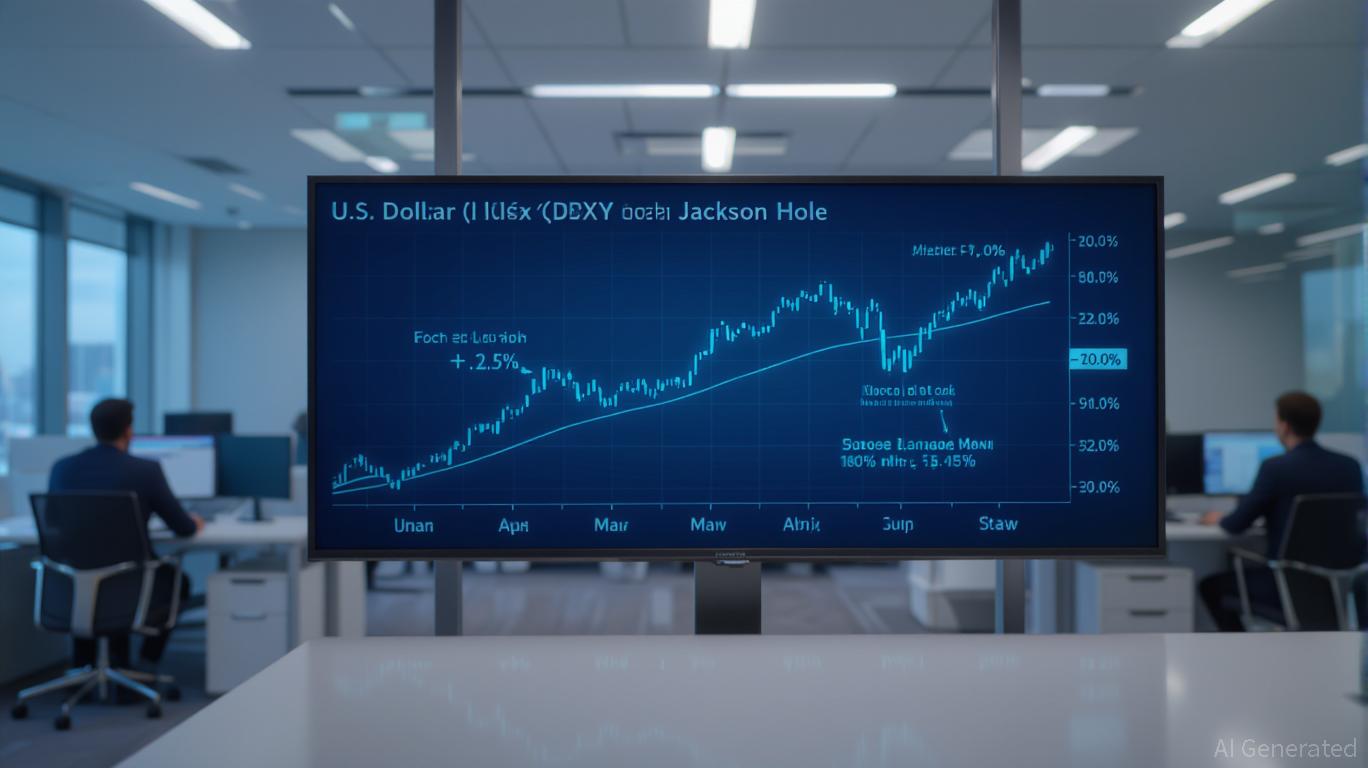
The 2025 Jackson Hole Economic Policy Symposium emerged as a pivotal moment for global central banks, with Federal Reserve Chair Jerome Powell’s remarks reshaping market expectations and underscoring the delicate interplay between central bank credibility and financial stability. As investors grapple with the implications of shifting policy frameworks and political pressures, the symposium’s legacy offers critical insights into how central bank communication and institutional independence influence market volatility.
The Fed’s Policy Pivot: Flexibility Amid Uncertainty
Powell’s speech at Jackson Hole signaled a nuanced recalibration of the Fed’s approach to monetary policy. The central bank abandoned its 2020-era “flexible average inflation targeting” framework, opting instead for a return to flexible inflation targeting while updating its language on maximum employment [1]. This shift reflects a recognition that the deliberate inflation overshoots envisioned in 2020 became irrelevant amid the post-pandemic surge in inflation [1]. By removing references to the “makeup” strategy, the Fed emphasized a balanced approach to its dual mandate, acknowledging that structural factors—such as tariff-driven inflation and demographic shifts—complicate traditional policy tools [6].
Markets responded swiftly to these signals. According to a Bloomberg report, the probability of a 25-basis-point rate cut at the Fed’s September 2025 meeting surged to 85%, with further easing anticipated by year-end [3]. However, Powell’s emphasis on a “data-dependent” approach—highlighting a “curious kind of balance” in the labor market—served as a cautionary note. The labor market, he warned, faces “downside risks to employment” despite a historically low unemployment rate, as both supply and demand for workers slow [5]. This duality—optimism about rate cuts tempered by structural fragility—has created a volatile environment for investors.
Political Pressures and the Erosion of Credibility
The symposium also exposed growing tensions between central bank independence and political interference. U.S. President Donald Trump’s public criticism of Fed Governor Lisa Cook and his calls for aggressive rate cuts threatened to undermine the Fed’s institutional credibility [1]. As noted by the Atlantic Council, central bank independence is historically correlated with lower inflation and greater financial stability. In countries like Turkey and Argentina, where political interference has compromised monetary autonomy, the result has been currency volatility, capital flight, and higher inflation [1].
Powell’s reaffirmation of the Fed’s commitment to data-driven decision-making was a strategic move to counter these pressures. Yet, the mere presence of political challenges has already begun to ripple through markets. When Trump initially threatened to remove Powell, the U.S. dollar fell sharply, reflecting investor concerns over the potential politicization of monetary policy [1]. This underscores a broader truth: central bank credibility is not just a policy concern but a market-moving force.
Market Volatility: A Double-Edged Sword
The Jackson Hole announcements have amplified market volatility, driven by divergent interpretations of central bank signals. On one hand, dovish policy expectations have fueled equity rallies and safe-haven demand for gold, while the U.S. dollar weakened against the euro and yen [2]. On the other, the Fed’s acknowledgment of inflation risks—despite its rate-cut signals—has kept investors wary of stagflationary pressures [3].
This volatility is further compounded by global policy divergences. While the Fed signals easing, the European Central Bank (ECB) has maintained a cautious stance, emphasizing the resilience of the European labor market [4]. Such asymmetries create systematic investment opportunities but also heighten risks for emerging markets, where capital flight and currency instability could intensify if central bank credibility erodes further [5].
The Path Forward: Balancing Flexibility and Credibility
For investors, the post-Jackson Hole landscape demands a nuanced approach. Central banks must navigate a “hard road ahead,” as Bloomberg aptly noted, balancing short-term market expectations with long-term credibility [6]. The Fed’s revised framework—anchoring inflation expectations at 2% while allowing for broader interpretations of employment flexibility—provides a blueprint for this balance. However, sustained political pressures could test this framework, particularly if Trump’s rhetoric escalates.
In the short term, markets will likely remain sensitive to central bank communication. As Bo Sun of the University of Virginia’s Darden School of Business explains, “Investors not only interpret the remarks but try to guess how other investors will interpret the remarks” [2]. This recursive dynamic means that even minor deviations from expected policy paths could trigger sharp market swings.
Conclusion
The Jackson Hole 2025 symposium has crystallized the challenges central banks face in maintaining credibility amid evolving economic and political landscapes. For investors, the key takeaway is clear: central bank independence and transparent communication are not abstract concepts but foundational pillars of market stability. As the Fed and its global counterparts navigate the next phase of policy adjustments, the interplay between credibility and volatility will remain a defining theme for financial markets.
Source:
[1] Trump’s challenges to the Fed’s independence loom over Jackson Hole [https://www.atlanticcouncil.org/blogs/econographics/trumps-challenges-to-the-feds-independence-loom-over-jackson-hole-symposium/]
[2] Why the Fed’s Words Move Markets [https://ideas.darden.virginia.edu/decoding-Fedspeak]
[3] Key Takeaways From Fed Chair Powell’s Jackson Hole Speech [https://www.bloomberg.com/news/articles/2025-08-22/key-takeaways-from-fed-chair-powell-s-jackson-hole-speech]
[4] Jackson Hole 2025: Navigating a New Era in U.S. Monetary Policy [https://www.chathamfinancial.com/insights/jackson-hole-2025-navigating-a-new-era-in-u-s-monetary-policy]
[5] Jackson Hole: Markets Need Powell and Global Central Banks to Defend Independence [https://www.investing.com/analysis/jackson-hole-markets-need-powell-and-global-central-banks-to-defend-independence-200665676]
[6] Fed’s Jackson Hole Exposes Hard Road Ahead for Central Bankers [https://www.bloomberg.com/news/articles/2025-08-24/fed-s-jackson-hole-exposes-hard-road-ahead-for-central-bankers]
